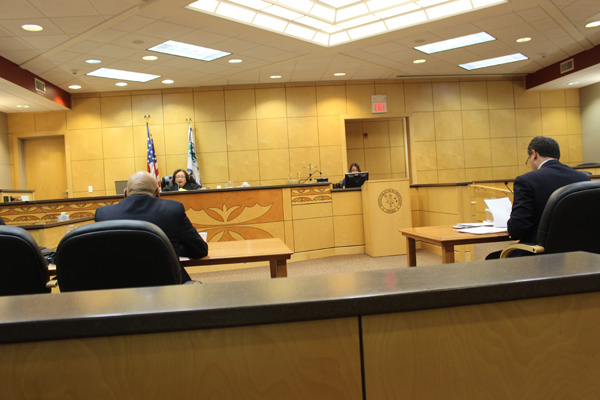Funmaker files lawsuit against Ho-Chunk Legislature for inaction
By Ken Luchterhand

Too much time had passed and nothing had been done, said Ho-Chunk member and veteran Gary Funmaker.
Funmaker filed a lawsuit against the Ho-Chunk Legislature on October 18 for that very reason. According to Funmaker, the General Council gave directives by way of resolutions to the Legislature, but the Legislature has failed to act.
Funmaker represented himself in Ho-Chunk Nation Trial Court on November 19 to contest that the Legislature has not acted upon 165 resolutions that have been passed by General Council. In particular, Funmaker was interested in the resolution, passed by General Council on September 27, 2014, that immediately sell Chicago properties known as Southland.
Attorney Michael Murphy also was present, representing the Ho-Chunk Legislature, before Judge Mary Jo Hunter.
The session was a motion hearing, with Murphy filing for the court to dismiss the case based on a lack of waiver of sovereign immunity, meaning the Legislature could not be sued because of immunity provided to them by the Ho-Chunk Constitution.
Murphy had filed for a motion to dismiss on October 28.
Funmaker made the point that he had talked to General Council Agency Attorney John Swimmer and that he indicated that it stipulates in the Constitution that the Ho-Chunk General Council could do so. Funmaker maintained that he is a member of General Council as a Ho-Chunk member.
He pointed out that, starting on page three of the Constitution, Section 3, it says, “This policy shall be made into laws, including codes, ordinances, resolutions and statutes by the Legislative Branch of the Ho-Chunk Nation within 45 days after majority vote of the qualified voters of the Ho-Chunk Nation General Council at Annual Meetings and Special Meetings. The Executive Branch shall enforce this policy within 60 days of the majority vote of the qualified voters of the Ho-Chunk Nation General Council. In the event that this policy is not enacted by the Legislative Branch or enforced by the Executive Branch within 15 days of the aforementioned deadlines, the Ho-Chunk Nation General Council shall file suit in the Ho-Chunk Nation Tribal Court against the elected officials of the Ho-Chunk Nation branch of government. The Supreme Court of the Ho-Chunk Nation shall have original jurisdiction within 15 days of the filing date of the suit.”
Judge Hunter asked why Funmaker was bringing the lawsuit to the court versus the General Council Agency.
“I’m filing this as a member of General Council, as a Ho-Chunk member and as a veteran,” he said. “It’s my right to speak up. I served for this freedom and these rights have to be acted upon.”
Murphy referred to an amendment to the Constitution, Amendment Number X, which states, “The Ho-Chunk Nation shall be immune from suit except to the extent that the Legislature expressly waives its sovereign immunity, and officials and employees of the Ho-Chunk Nation acting within the scope of their duties or authority shall be immune from suit.”
The terms if which the waiver is instituted is if they were doing their duties, which they weren’t, contented Funmaker. They weren’t acting on their duties as handed down by General Council.
“The problem is, they did take action. They just didn’t sell the property. But they did take action,” Murphy said.
“Amendment 10 does bring about the waiver of the Executive and Legislative branches. A suit could be filed by General Council, but only if they didn’t take action,” Murphy said. “If the Legislature didn’t take action, then a lawsuit is in order.”
Judge Hunter asked what type of action was conducted on the resolution.
Murphy said the resolution was referred to lawyers for an opinion and that referral is a type of action.
Judge Hunter asked Funmaker if he believed referring the issue to lawyers was sufficient to be considered it to be acted upon, to which Funmaker said, “No.”
Judge Hunter also questioned Funmaker if he had any documentation or any representation by legal counsel.
Funmaker said he had hoped Attorney Swimmer would have been present for the hearing, but he wasn’t. He was given the opportunity to obtain counsel and to reconvene to continue with the motion hearing.
The next hearing has been set at 10 a.m. Thursday, December 10, at the Ho-Chunk Nation Tribal Courtroom in Black River Falls.
“I see the sovereignty issue as moot, when it comes to the General Council making policy or bringing forth a resolution that is brought forward by majority vote during General Council that we enjoy annually to voice our opinions,” Funmaker said after the court session. “So when we take it to court the sovereignty issue or veil does not exist, why because it is in favor of the Ho-Chunk people to act and offer majority opinions and give to 13 members of the legislature to action.
“They take an oath to act on the people's behalf. Now with 165 resolutions that have not been acted upon it is cause for a Special General Council to be called by Wilfred Cleveland, because he could have called for action on all the resolutions presently not acted upon, the Executive is also part of this lack of action on the ruling body of the Ho-Chunk Nation,” Funmaker said.
He said that handing the resolution to study for an indefinite amount of time is not the definition of acting upon it.
“Our Constitution is either law or we have no authority or statutes to have any order in our Nation. The people must be heard on this administrative failure by their government,” he said.
Home